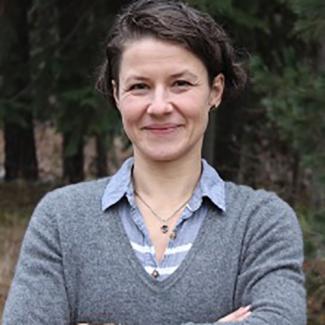Langsci After Grad is a new series interviewing graduate degree and post-doctoral alumni with language sciences qualifications about their transition from academia to employment, written by AJ Orena
Dr. Sonja Thoma first became interested in language documentation and revitalization while completing her Linguistics doctorate at UBC in 2016.
With her company Linguistics in the Wild, Dr. Thoma now freelances as a consultant for various projects, including ones that support First Nations languages. She discusses her work as a language coach for the First Nations Education Steering Committee (FNESC), how she got the job, and shares career advice for current graduate students.
What have you been working on, post-PhD?

After my PhD, I started working with the Stó:lō Service Agency, an organization that serves 11 Halq'eméylem-speaking communities along the Upper Fraser river. This experience working directly in communities gave me the required background to apply for the job at FNESC. As a language coach, I go into schools across BC and work with language teachers, coaching them to be confident in their curriculum on their respective First Nations language.
You can’t just superimpose the curricula of other languages that are around the province, because the language structure, cultural content and worldview is different. Each community has very different needs, and each teacher comes with a very different set of skills, so it’s been thrilling work.
Apart from that, I’ve been building a diversified portfolio using skills I developed from my PhD. I was asked recently to consult on a local project here on the Sinixt dialect. I also did some data visualization work in collaboration with another researcher.
More recently, I’ve been working with a former colleague on fostering a network of linguists who want to do good, ethical work for the Indigenous community in documenting and revitalizing languages. So, it’s piecemeal, but I’m very happy because I’m not locked into any one thing, and they’re exciting work!
How did you find, and land, these jobs?
In the past few years, the provincial and federal government committed funding towards language revitalization, so Bands can apply for funding to support their revitalization efforts. Some decide to hire linguists to support them. FNESC also received some of this funding, which allowed them to fund positions for language coaches, so I applied, thinking ‘this is exactly what I want to be doing’.
It’s a wonderful way to apply myself in a meaningful way, and as a settler and immigrant to this area, I feel quite humbled to be able to step into this role.
A lot of my other work came from talking, talking, talking to people, and just being enthusiastic! I did a couple of informational interviews with people, not necessarily because I wanted a job from them, but because I wanted to know about their work with Indigenous communities in the interior. But, because of this connection, they mention my name and refer me when there’s new work.
How did your time at graduate school, and training, help your career?
The work I do draws on my research skills because I have to continuously figure out strategies that work for individuals for language teaching and curriculum development. Research isn’t something you just know – it’s a learned skill, and graduate work trains you to be a critical thinker.
You also learn a lot about grit and tenacity in grad school – a good life skill!
I also do a bit of work with language-based learning disabilities, as two of my children are profoundly dyslexic. So, I started educating myself about this, and I realized that my linguistics background really helped me because I could access this literature very quickly. So, I started just in my community, and gave presentations to the school district, then was asked to speak at the Dyslexia Training Institute. That’s when I felt like I could actually have a career where I use my PhD and apply my skills.
What’s your advice for pursuing non-academic jobs?
Do it and see it as a viable option!
Take the time to sit down and think about the transferable skills that your specific academic work gives you – the research and supervision skills, critical thinking, project management. In academia, we don’t acknowledge how much we actually understand about the systematic approach to envisioning and pulling a project together. All of these are invaluable skills in jobs outside of academia.
Have questions for Dr. Thoma about her work or career path? Email her at info@linguisticsinthewild.ca
Main image credit: Paul H. Joseph / UBC Brand & Marketing
